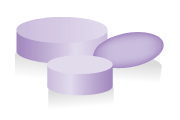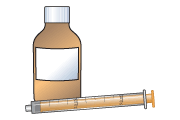Chlorothiazide for chronic lung disease and to improve heart function
This leaflet is for parents and carers about how to use this medicine in children. Our information may differ from that provided by the manufacturers, because their information usually relates to adults. Read this leaflet carefully. Keep it somewhere safe so that you can read it again.
Name of medicine
Chlorothiazide
Brand names: Different forms available including oral solution, oral suspension, and tablets (diuril)
Why is it important for my child to take Chlorothiazide?
Chlorothiazide helps your child to make more urine (wee) and therefore lose unnecessary extra fluid from the body. This reduces blood pressure and the work that the heart has to do. It may also reduce fluid in the lung, allow them to breath more effectively and reduce the amount of oxygen they need. Medicines that help the body to lose water are called diuretics (sometimes referred to as ‘water tablets’).
What is Chlorothiazide available as?
- Tablets: Diuril 250 mg tablets can be ordered specially from your pharmacist.
- Liquid medicine: 250 mg in 5 mLs can be ordered specially from your pharmacist.
When should I give Chlorothiazide
The Chlorothiazide is usually given twice each day. Give one dose in the morning and one in the evening. Ideally these times are 10–12 hours apart. For example, this could be between 7am and 8am and between 7pm and 8pm.
Chlorothiazide may also be given once a day. This can be in the morning or the evening.
Give the medicine at about the same time(s) each day so that this becomes part of your child’s daily routine, which will help you to remember.
How much should I give?
Your doctor will work out the amount of Chlorothiazide (the dose) that is right for your child. The dose will be shown on the medicine label.
It is important that you follow your doctor’s instructions about how much to give.
How should I give Chlorothiazide?

Tablets
- Tablets should be swallowed with a glass of water, squash or juice. Your child should not chew the tablets.
- You can crush the tablet and mix it with a small amount of soft food such as yogurt, honey, or mashed potato. Make sure your child swallows it straight away, without chewing.
- Wash your hands and all equipment used thoroughly afterwards to make sure that no-one else takes any of the medicine.

Liquid medicine
- Shake the medicine well.
- Measure out the right amount using an oral syringe or a medicine spoon. You can get these from your pharmacist. Do not use a kitchen teaspoon as it will not give the right amount.
When should the medicine start working?
Your child’s symptoms will start to improve after a few days, although you may not see any difference in your child.
It is important that you continue to give the medicine as you have been told to by the doctor.
What if my child is sick (vomits)?
- If your child is sick less than 30 minutes after having a dose of Chlorothiazide, give them the same dose again.
- If your child is sick more than 30 minutes after having a dose of Chlorothiazide, do not give them another dose. Wait until the next normal dose.
If your child is sick again, seek advice from your family doctor, nurse, pharmacist, or hospital. They will decide what to do based on your child’s condition and the specific medicine involved.
What if I forget to give it?
If you usually give it once a day: Give the missed dose when you remember during the day, as long as this is at least 12 hours before the next dose is due. If you remember after this time, do not give the missed dose. Wait until the next usual dose.
If you usually give it twice a day: If you remember up to 4 hours after you should have given a dose, give your child the missed dose. For example, if you usually give a dose at about 7am, you can give the missed dose at any time up to 11am. If you remember after that time, do not give the missed dose. Give the next dose as usual.
What if I give too much?
If you think you may have given your child too much Chlorothiazide, contact your doctor or local NHS services (details at end of leaflet) or take your child to hospital. Have the medicine container or packaging with you, even if it is empty. This will be useful to the doctor.
Are there any possible side effects?
We use medicines to make our children better, but sometimes they cause effects that we don’t want (side-effects).
Chlorothiazide can interfere with previous existing conditions like diabetes, gout and lupus (auto-immune conditions). Your doctor should be able to give you advice in these particular cases.
Side effects you must do something about
If your child feels very tired or weak, contact your doctor straight away.
If your child seems confused, irritable, or aggressive, contact your doctor straight away.
If your child is much more sleepy than normal and is difficult to wake up, contact your doctor straight away.
If your child has severe stomach pain, or severe diarrhoea and vomiting, contact your doctor straight away.
Other side-effects you need to know about
- Your child may feel sick (nausea), get constipation (difficulty doing a poo), or diarrhoea.
- Your child may get headaches and feel excessively tired (fatigue).
- Your child may have changes in their blood cell count.
They may feel light-headed or dizzy when they stand up, or may faint. This is because Chlorothiazide may lower the blood pressure. They should stand up slowly, and should lie down for a while if they feel dizzy. If this becomes a problem, contact your doctor.
They may get a rash or swollen, reddened, itchy skin. Contact your doctor or pharmacist if this becomes troublesome.
Your child may have a dry mouth. Eating citrus fruits (e.g. oranges) and sipping water may help.
There may sometimes be other side effects that are not listed above. If you notice anything unusual and are concerned, contact your doctor. You can report any suspected side effects to a UK safety scheme at mhra.gov.uk/yellowcard
Can other medicines be given at the same time as Chlorothiazide?
- You can give your child medicines that contain paracetamol or ibuprofen, unless your doctor has told you not to.
- Chlorothiazide should not be taken with some medicines. Tell your doctor or pharmacist about any other medicines your child is taking before giving Chlorothiazide.
Check with your doctor or pharmacist before giving any other medicines to your child. This includes herbal and complementary medicines.
Chlorothiazide is known to interact with medicines your child might take for diabetes, high blood pressure, gout, and with steroids and Lithium.
Is there anything else I need to know about this medicine?
- Your doctor will test your child’s blood regularly to check that Chlorothiazide has not affected their kidneys.
General advice about medicines
- Try to give medicines at about the same times each day, to help you remember.
- If you are not sure a medicine is working, contact your doctor but continue to give the medicine as usual in the meantime. Do not give extra doses, as you may do harm.
- Only give this medicine to your child. Never give it to anyone else, even if their condition appears to be the same, as this could do harm.
- If you think someone else may have taken the medicine by accident, contact your doctor or NHS local services (details at end of leaflet) for advice.
- Make sure that you always have enough medicine. Order a new prescription at least 2 weeks before you will run out.
- Make sure that the medicines you have at home have not reached the ‘use by’ date on the packaging. Give old medicines to your pharmacist to dispose of.
Where should I keep this medicine?
- Keep the medicine in a cupboard, away from heat and direct sunlight.
- It does not need to be kept in the fridge.
- Make sure that children cannot see or reach the medicine.
- Keep the medicine in the container it came in.
Who to contact for more information?
Your doctor, pharmacist or nurse will be able to give you more information about Chlorothiazide and about other medicines used to treat chronic lung disease, heart failure, ascites and high blood pressure.
England: NHS 111
Tel 111
www.nhs.ukScotland: NHS 24
Tel 111
www.nhs24.scotNorthern Ireland: NI Direct
Wales: NHS 111 Wales
Tel 111
www.111.wales.nhs.ukCopyright disclaimer
Version [1]. © NPPG, RCPCH and WellChild, all rights reserved. Review by September 2024.
The primary source for the information in this leaflet is the British National Formulary for Children. For details on any other sources used for this leaflet, please contact us through our website, www.medicinesforchildren.org.uk.
We take great care to make sure that the information in this leaflet is correct and up-to-date. However, medicines can be used in different ways for different patients. It is important that you ask the advice of your doctor or pharmacist if you are not sure about something. This leaflet is about the use of these medicines in the UK, and may not apply to other countries. The Royal College of Paediatrics and Child Health (RCPCH), the Neonatal and Paediatric Pharmacists Group (NPPG), WellChild and the contributors and editors cannot be held responsible for the accuracy of information, omissions of information, or any actions that may be taken as a consequence of reading this leaflet.
